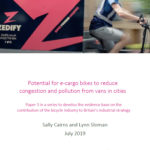The UK is falling behind when it comes to green transport because it is failing to promote electric pedalling alongside electric cars, says the cycle industry trade body, the Bicycle Association.
Backed up by research from consultancy Transport for Quality of Life, the Bicycle Association argues that incentives to boost e-bikes are better-value, more equitable and healthier than subsidising the purchase of electric cars – and could potentially achieve change more quickly.
The research shows that the cost of saving a kilogram of CO2 via schemes to boost e-bikes is less than half than the cost of existing grants for electric cars such as the Tesla S – and at a cost per purchase of less than one tenth of the grant for electric cars.
The Bicycle Association believes that electric vehicles will play a key role in decarbonising all forms of transport, but argues that e-bikes should be a top priority for urgent Government support.
The findings will be launched at a meeting of the All-Party Parliamentary Cycling Group in the Houses of Parliament on the 8th July 2019, attended by numerous MPs, officials and decision-makers.
E-bikes are bicycles equipped with a small, power-limited electric motor, which assists only when you pedal and cuts out at 15.5 mph. Riders must be 14 or over, but in all other respects e-bikes are treated just like bicycles under traffic regulations. They help to reduce the effort of pedalling, especially on hills, but studies have shown that the rider still very much benefits from the exercise of cycling.
E-bike use is growing steadily in the UK, with about 60,000 sold last year- but that’s a tiny figure, at less than 3% of the market. This is eclipsed by take-up in mainland Europe, where both national and regional governments use a variety of incentive schemes to promote e-bikes. In Germany, for example, almost one million e-bikes were sold in 2018, around nine times more per head of population than in the UK.
The evidence shows that around half of all trips by e-bike replace a trip that would have been made by car. E-bikes are also used for longer trips than conventional bikes, so their potential to reduce carbon emissions, air pollution and congestion is correspondingly even greater. And unlike electric cars, which tackle pollution but do not tackle congestion, e-bikes are ready now for mass adoption.
None of the current barriers to wider e-car ownership, such as high purchase prices, range anxiety or a need for expensive charging infrastructure, apply for e-bikes.
Steve Garidis, Executive Director of the Bicycle Association, said:
“The time is right for national Government and city regions to kick-start wider e-bike uptake with purchase incentive schemes. The results in terms of CO2 and congestion reduction will be fast and at a remarkably low cost – a game-changer in clean urban transport.”
Chris Boardman, Greater Manchester Walking & Cycling Commissioner said:
“I can see the huge potential of e-bikes, they are the perfect tool to entice many people, who don’t want to be a cyclist, out of the car. I whole heartedly support any measures that make that choice easier and I am very keen that Greater Manchester becomes the first Demo Region to pilot measures to give people this viable alternative to driving. I will work with both the industry and government to explore how we make that happen as quickly as possible.”
Alongside advocating purchase incentives for personal e-bikes, the Bicycle Association also argues there’s a huge potential to build on the existing Department for Transport grants scheme for electric cargo bikes, which can carry up to 250kg of cargo around cities and replace nearly 1 in 3 delivery trips by van.
In a second report commissioned by the Bicycle Association from Transport for Quality of Life, evidence shows that up to 30% of commercial van journeys in urban areas could be substituted by e-cargo bike deliveries, which could lead to even greater reductions in congestion and air pollution.
Among the measures called for in the report are “Demonstration Cities”. These could intensively trial e-cargo bike logistics, encourage public sector procurement of e-cargo bike services, provide community e-cargo bikes for public use – and help to develop best practice for future national roll-out.
In summary, measures to boost both e-bike and e-cargo bike use would swiftly, and at low cost, bring about significant reductions in emissions and urban congestion, and improve levels of physical activity. The Bicycle Association invites policy-makers at national and city-region level to realise the potential of this existing, readily-available (and rapidly innovating) game-changing technology.
Both research reports, commissioned by the Bicycle Association from Transport for Quality of Life, are available for download free of charge above.
The Bicycle Association is the trade body for the UK cycle industry, representing over 70 member companies. https://www.bicycleassociation.org.uk/
Transport for Quality of Life is a consultancy specialising in sustainable transport.
https://www.transportforqualityoflife.com/

